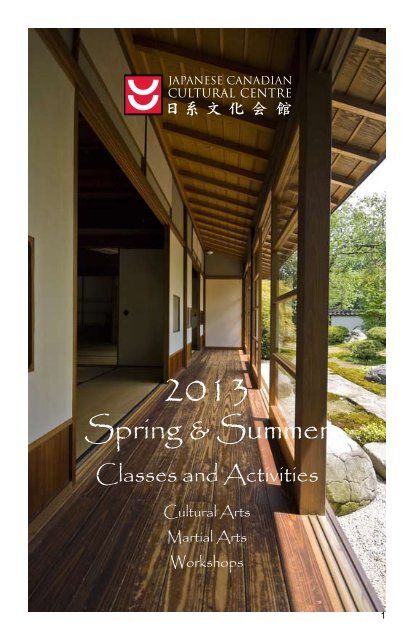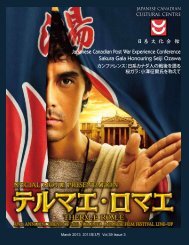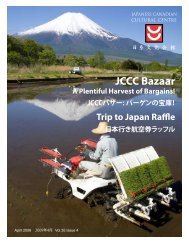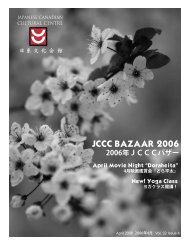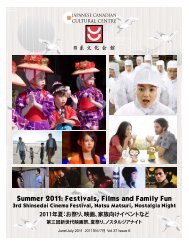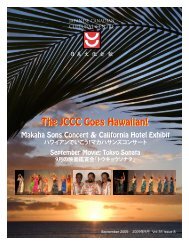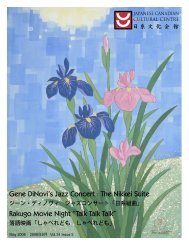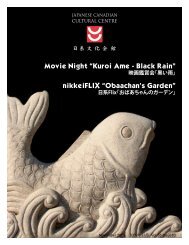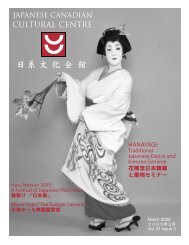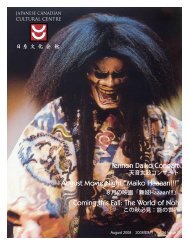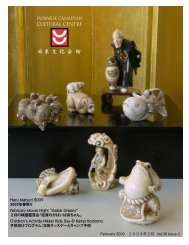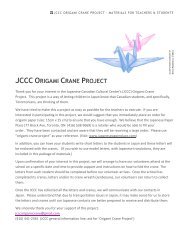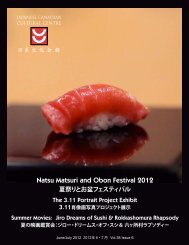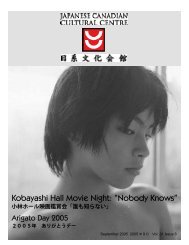Spring & Summer - Japanese Canadian Cultural Centre
Spring & Summer - Japanese Canadian Cultural Centre
Spring & Summer - Japanese Canadian Cultural Centre
- No tags were found...
You also want an ePaper? Increase the reach of your titles
YUMPU automatically turns print PDFs into web optimized ePapers that Google loves.
Membership and Policy 1<strong>Cultural</strong> Arts, Workshops and RecreationBunka Shishu (Needle Punch Embroidery) 4Shodo 4<strong>Japanese</strong> Language for Adults 5Ikebana (Flower Arranging) 6Ikenobo School 6Sogetsu School 6Sumi-e (Brush Painting) 7Sadou (Tea Ceremony) 8Hula for Health 9Etegami (Picutre Letter) 10Origami Workshop 10Taiko Druming Workshop 11Manju Workshop 12Other ActivitiesYamaha Music Course 13JCCC/JSS Workshops 13West Meets East 13Wynford Seniors Club 13JCCC Ping Pong Club 13Ayame Kai 14Sakura Kai 14Himawari Buyo-Kai 14Ohana Hula 14JCCC Bridge 14JCCC Karaoke 14JCCC Token Kai 14Monthly J-Cinema 26Martial ArtsMartial Arts General Information 15-17Aikido 18Iaido 19Judo 20Shito-ryu Itosu-Kai Karate and Kobudo 21Kendo 22Kyudo 23Naginata 24Shorinji Kempo 25Class Registration Form 27Membership Form 28<strong>Japanese</strong> instruction available (all instruction in English unless noted)3
JCCC <strong>Spring</strong> 2013 class ScheduleClass Start Date Time LevelBunka Shishu Mon. Mar. 18 7:30pm - 9:30pm AllTue. Mar. 19 10:00am - 12:00pm AllThu. Mar. 21 1:00pm - 3:00pm AllIkenobo Ikebana Wed. Mar. 20 7:30pm - 9:00pm AllThu. Mar. 21 1:00pm - 2:30pm AllSogetsu Ikebana Tue. Mar. 19 7:30pm - 9:00pm Beg.Thu. Mar. 21 7:30pm - 9:00pm Adv. & Ext.<strong>Japanese</strong> Language Tue. Mar. 19 7:30pm - 9:00pm AllShodo Fri. Mar. 22 1:00pm - 3:00pm AllFri. Mar. 22 3:00pm - 5:00pm AllFri. Mar. 22 7:00pm - 9:00pm AllSumi-e Mon. Mar. 25 7:30pm - 9:00pm Beg.Mon. Mar. 18 7:30pm - 9:00pm Int. & upWed. Mar. 20 10:30am - 12:00pm Adv. (3yrs+)Wed. Mar. 20 1:30pm - 3:00pm AllHula for Health Mon. Mar. 25 7:00pm - 8:30pm Int.& Adv.Wed. Mar. 27 7:00pm - 8:30pm Beg.Ukulele Thu. Mar. 21 7:00pm - 8:00pm Beg. AThu. Mar. 21 7:00pm - 8:00pm Beg. BTea Ceremony Fri. Apr. 5 1:00pm - 3:00pm AllFri. Apr. 5 7:00pm - 9:00pm All* JCCC Membership is required to register for class.* Payment must be made at the time of registration or by 7 days prior to the1st class.* No class spot reservations accepted without payment.* Pre-registration is recommended as classes fill up quickly.* Class refunds are available before the 2nd week class only; a 15%administrative fee will be charged.* Membership fees are not refundable.* Please see page 1 of this brochure for details on Membership and ClassPolicy* Starter Kits for Ikebana, Shodo, Sumi-e are available at the JCCC giftshop.5
JAPANESE LANGUAGE FOR ADULTS10 ClassesStudents learn the language of modern Japan. Structured classes, in an informalsetting, provide the opportunity for active participation and practice. 10 Classes.Instructors: Akiko Maruoka (Coordinator) Sachiko Kagitomi, Yumi Kosaka, TaikoFeldkamp, Saori Matsuyama, Yoko Tsuboi, Osamu ShinyaBEGINNER I provides learners with the basic functional conversation strategies andvocabulary essential to communicate in <strong>Japanese</strong>. The focus is on simple statementsand questions related to addresses, phone numbers, day, time, counting objects, placeand location. The Hiragana writing system will be introduced. This class is for studentswho are studying <strong>Japanese</strong> for the first time.BEGINNER II builds on the foundation established in Beginner I. The focus remains onpractical communication in every day life, and a study of basic grammar and Hiraganaprepares students to master <strong>Japanese</strong> at a higher level. The Katakana system will beintroduced.BEGINNER III continues to develop the learner’s four skills, focusing on practicalcommunication such as asking permission, refusal and expressing preferences.Students are required to finish Beginner II or have basic knowledge of Hiragana andKatakana writing systems. Study will focus on exercising Hiragana and Katakana.LOW INTERMEDIATE <strong>Japanese</strong> balances the need to actively communicate with afurther deepening of the learner’s mastery of reading, writing and grammar. Studentsneed the knowledge of Hiragana and Katakana. Some Kanji will be introduced.HIGH INTERMEDIATE is a continuation of Low Intermediate focusing on developingmore fluency in everyday communications.**NEW!** Conversational <strong>Japanese</strong> is an informal conversation class thatmaintains your knowledge and improves it through a variety of oral communicationskills. Everyone is welcome if you have completed the Low Intermediate or equivalentlevel.Start Date Time LevelTue. Mar. 19 7:30 - 9:00pm AllFee:$91 (plus HST).Textbook <strong>Japanese</strong> for Busy People Vol.1 & 2Revised 3rd Edition, available at the JCCC Giftshop.7
IKEBANA (Flower Arranging)10 ClassesIkebana is the art of arranging flowers or plants to reflect their natural beauty. Itoriginated in early Buddhist years and developed into a distinctive art form in the15th century, with many different styles and schools. The JCCC offers classes by theIkenobo School and the Sogetsu School.IKENOBOLike a poem or painting made with flowers, Ikenobo expresses both the beauty offlowers and the beauty of longing in your heart. Ikenobo considers a flower bud mostbeautiful ... past, present and future ... responding to an everchanging environment.You will take home your creations.Instructor: Betty Lou Arai - is a Professor of Ikebana - Ikenobo School, headquarteredin Kyoto. She has studied in Japan and has been teaching since 1977. The stylesof Ikenobo are always changing and Mrs. Arai teaches both modern and traditionalstyles.Start Date Time LevelWed. Mar. 20 7:30 - 9:00pm AllThu . Mar. 21 1:00 - 2:30pm AllFee: $75 (plus HST).Materials are extra. Starter Kit, as well as scissors, containers, kenzan and kenzancase are available at JCCC Giftshop.SOGETSUSogetsu Ikebana Toronto East Branch of Ikebana schoolThe Sogetsu School of Ikebana believes anyone can arrange Ikebana anywhere withmultitude of material as people are different from each other. Sogetsu encouragestudents to be individual and imaginative. There are no limitation to the variety ofmaterials used depending on their levels prescribed in the Sogetsu Text Book usedworldwide.Instructors: The classes are led by the Director of Sogetsu Ikebana Toronto EastBranch, Kyoko Abe, with Ayako Sugino (Tue.) and Ruby Chan (Thu.)Start Date Time LevelTue. Mar. 19 7:30 - 9:00pm BeginnerThu. Mar. 21 7:30 - 9:00pm Advanced, Extension I, IIFee: $75 (plus HST).Materials are extra. Starter Kit, as well as scissors, containers, floral tape, kenzan andkenzan case are available at JCCC Giftshop.8
SUMI-E (Brush Painting)8 ClassesSumi-e is a traditional <strong>Japanese</strong> brush paintingtechnique, which is based on using an orientalbrush and black ink or subtle watercolours onrice paper. This course is open to students of alllevels, from beginner to advanced.Creative Sumi-e Course (Wednesdaymornings only)This course is open for students who have 3years or more experience in Sumi-e. Duringthis course, students will develop their stylesand create artworks of their own and alsostudy Sumi-e techniques of specific historical<strong>Japanese</strong> artists.Instructors: Hiroshi Yamamoto (Hakuho) - Studied <strong>Japanese</strong> Traditional Art andArt History at the Kyoto Industrial Design Institute Japan and the Kyoto <strong>Japanese</strong> ArtSchool. Hiroshi has held more than 20 exhibitions in Canada as well as in Japan. Hehas taught Sumi-e for 11 years.Natalie Griller (B.F.A., M.Sc.) – Specializing in sumi-e to express themes of nature,the Arctic, and artistic/spiritual experience, Natalie has sold her art for over 20 years.She studied at the University of Manitoba School of Fine Arts, Winnipeg Forum ArtInstitute and JCCC. She has taught painting since 2002, helping painters discovertechnical and artistic freedom.Start Date Time LevelMon. Mar. 25 7:30 - 9:00pm Beginner*Mon. Mar. 18 7:30 - 9:00pm Intermediate, Advance, ExtensionWed. Mar. 20 10:30am - 12:00pm 3 years or more experienceWed. Mar. 20 1:30 - 3:00pm All*please note the start date of the Monday beginner class.Fee: $70 (plus HST)Materials are extra. Brush, sumi (ink stick), suzuri (inkstone) and rice paper availableat the JCCC gift shop.9
chado (Tea Ceremony)Translated as the "Way of Tea", Chado, or<strong>Japanese</strong> tea ceremony, is an icon of traditional<strong>Japanese</strong> culture. The spirit of WaKei Sei Juku, (harmony, respect, purity andtranquility) are the basic principles underlyingChado. A tea ceremony brings togethermany important aspects of <strong>Japanese</strong> cultureand values including flower arrangement,calligraphy, poetry and the pursuitof harmonious interaction. In this class,students will learn the basic procedures formaking tea as well as how to integrate the spirit of tea into their study and daily lives.Necessary equipment include Fukusa, Kobukusa, yo-ji, kaishi(special paper used intea ceremony). Please bring them along if you have them. They will also be availablefor purchase at the JCCC Giftshop.2013 <strong>Spring</strong> Class Dates: Fri. April 5, 12, 19, 26, May 10, 17, 24, 31Afternoon ClassTime:Evening ClassTime:1:00 – 3:00pm7:00 – 9:00pmFee: $70 plus HSTInstructors: Members of the Urasenke Tankokai Toronto Chapter10
RECREATIONHULA FOR HEALTH10 ClassesLets have fun together with lots of aloha spirit!•Intermediate Class I Max: 15 studentsMust have completed two or three sessions of basics or beginners class. Those whowant to take this class will be assessed by the instructor.•Intertmediate Class II Max: 15 studentsThis class is more advanced class than Intermediate I. Those who want to take thisclass will be assessed by the instructor.•Senior ClassMax: 20 studentsFor seniors who want to learn, enjoy the music and exercise.Start Date Time LevelMon. Mar. 25 7:00 - 8:30pm Intermediate I (No class on May 20)Mon. Mar. 25 7:00 - 8:30pm Senior (No class on May 20)Wed. Mar. 27 7:00 - 8:30pm Intermediate II (No class on April 10)Fee: $50 (plus HST) - JCCC membership required.Please register ONE WEEK PRIOR TO THE FIRST CLASS.Instructors: Alma “Wailana” Ona - Shestarted dancing in 1985 under ReneeCruz (who started HULA here in Toronto).After a few months, started taking workshopsin Hawaii and mainland USA, twicea year. Started teaching in 1987 andcompeted in Hawaii twice. She performedat the Caravan for several years, dancingMaori dances. Her hula mentor is ChinkyMahoe.Velta Smith - She has been involved in Hawaiian Hula for 30 years as a performer andan instructor.Photos courtesy of Constantin Dutescu.11
ETEGAMI (Picture Letter)Are you interested in drawing and watercolour painting buthave never tried it before? Etegami (Picture Letter) is theperfect thing to try for someone like you! You do not haveto have any experience in art. Etegami is a communicationtool for sending your feelings to someone whom youcare about. Why not make an original postcard? Familyparticipation welcome!Instructor: Sachiko Hata Pereklita4 Workshops will be scheduled for the <strong>Spring</strong>. Please check the JCCC Newsletter andthe JCCC website (www.jccc.on.ca) for information regarding class schedule.Workshop #1: Wild flowers in anticipation for <strong>Spring</strong>Workshop #2: Fruits and Blossoms from cherry, peach and apple treesWorkshop #3: Thank you card for plants, nature, and familiesWorkshop #4: Etegami on a fan to welcome the <strong>Summer</strong>Please bring your Etegami painting supplies if you have them.Age: From children** to adults **Children have to be able to write the alphabet and/orHiragana. Parental supervisionrequired for children under age 13ORIGAMI - FUN WITH FOLDING PAPERThis unique new series of Origami workshopskicks off again with John Jay Guppy from theOrigami Society of Toronto. Folding both traditionalfavourites and the latest new models, this giveseveryone a chance to try their skill with plenty ofexpert help available. All paper is provided.2013 <strong>Spring</strong> Dates:Thu. Mar. 21, Thu. Apr. 18, Thu. May 23Time: 7:30 - 9:00pmFee: $7 (plus HST) per class for JCCC members$10 (plus HST) for non-membersDesk organizer. Photo Courtesy ofJohn Jay Guppy.To learn more about the Origami Society of Toronto please go towww.origamiToronto.org.12
TAIKO DRUMMING WORKSHOPTaiko drumming workshops for beginners, experienced and youth. Come out and catchthe taiko spirit!Workshops will be offered for beginners who want to try taiko for the first time as wellas returning taiko enthusiasts who wish to further develop their skills. Youth workshopsare being offered for children and youth between the ages of 4-15.Please check monthly newsletter for details on specific workshops, dates and times.About YakudoTaiko are traditional <strong>Japanese</strong> drums used historically to summon spirits for fortune,strength and harmony. Their powerful sounds are rumoured to shake the earth andheavens above. A mighty thunderous sound yet, much like the sound of a mother’sheartbeat to her child, it can be rhythmically soothing.Yakudo is a non-profit organization, promoting <strong>Japanese</strong> culture through music andperformance on Taiko. All the performers are active volunteer members, taking onvarious roles to keep this group functioning. In addition to performing, all members doa number of behind the scenes work ranging from teaching, composing, promotions,administration, fundraising, booking, performance production and more.Founded in 1992, Yakudo follows in the Suwa tradition of taiko drumming. Comingfrom all over the GTA, performers rehearse no less than twice a week at our studio inMarkham, Ontario.WORKSHOPS IN JAPANESEA series of casual workshops centered around hobbies and lifestyles, particularly butnot exclusively for <strong>Japanese</strong>-speaking immigrants and long & short-term visitors fromJapan. All workshops will be conducted in <strong>Japanese</strong>. Please see <strong>Japanese</strong> section ofthe newsletter or email jpals@jccc.on.ca for details.JCCC 日 本 語 プログラム主 に 日 本 人 移 住 者 、 長 期 ・ 短 期 滞 在 者 を 対 象 に 日 本 語 で 行 うワークショップやセミナーなどのプログラムです。 目 的 である「みんなで 楽 しむ 場 を 設 ける」を 広 げるため、 今 後 もいろいろな 企 画 を 計 画 していきます。13
MANJU WORKSHOPThe ever-popular Manju (<strong>Japanese</strong> rice cake sweets) is back! “Chef Shoji” will beconducting two hands-on workshops at the JCCC.“Chef Shoji” has been teaching cooking classes at the <strong>Canadian</strong> <strong>Japanese</strong> <strong>Cultural</strong><strong>Centre</strong> in Hamilton for the past few years. Over this time, he built up quite a repertoireof <strong>Japanese</strong> recipes. He has recently developed some new and scrumptious recipesfor Mochi and Manju (<strong>Japanese</strong> rice cake sweets).Chef Shoji’s Introductory Manju WorkshopLearn to make Dorayaki (pancake manju), Ohagi (red bean paste covered sweet rice),Kinako Mochi (toasted soy bean flour covered sweet rice), Azuki (red beans) andLima bean filling for Manju. See Chef Shoji demonstrate his 10-minute Mochi Manjutechnique. Limited to 20 students.Chef Shoji’s Advanced Manju WorkshopLearn to make Mushi Manju (steamed), Yaki Manju (baked) and next generationMochi Manju. See Chef Shoji demonstrate his 10-minute Mochi Manju technique(advanced).Date Time LevelMon. Mar.18 7:00 – 10:00pm IntroductoryMon. Apr. 22 7:00 – 10:00pm IntroductoryMon. May 27 7:00 – 10:00pm AdvancedFee:$25 (plus HST) per workshop for JCCC members$30 (plus HST) per workshop for non-membersMaterials - $10 payable to instructor.Please bring an apron.Class schedule is subject to change.Please call JCCC reception to confirm before booking.“Chef Shoji” has been teaching cooking classes at the <strong>Canadian</strong> <strong>Japanese</strong> <strong>Cultural</strong><strong>Centre</strong> in Hamilton for the past few years. Over this time, he built up quite a repertoireof <strong>Japanese</strong> recipes. He has recently developed some new and scrumptious recipesfor Mochi and Manju (<strong>Japanese</strong> rice cake sweets).14
YAMAHA MUSIC COURSEKEYBOARDFREE introductory lessons! Learn to play the electronic keyboard using the worldrenowned Yamaha Music Education System. Music of all styles is taught in a motivatinggroup setting. Class times are available for both seniors and adults. (Beginner,Intermediate and Advanced, Basic Theory). Please call for up to date information onspecific times. There are 10 classes per session. Sessions run year round.Start date: Please call JCCC at 416-441-2345Time: Wednesdays 10:00am – 6 :00pm (no evenings)Class fee: $120.00 per 10 week session5 FREE LESSONS for new studentsPrivate lesson: $24.50 per half an hour + Registration fee $45.00JCCC - JSS Collaborative WorkshopsFrom time to time, the JCCC and the <strong>Japanese</strong> Social Services (JSS) will be offeringcollaborative workshops to support the needs of the <strong>Japanese</strong>-speaking communityand centre members. JSS is a non-profit, charitable organization providing bilingualprofessional social services such as counseling and educational programs to the<strong>Japanese</strong> ethno-cultural community in the Greater Toronto Area.Please call 416-385-9200 or visit www.jss.ca for more information.WEST MEETS EASTJAPANESE BUSINESS & PROTOCOL TRAININGThrough West Meets East human resource training seminars, the JCCC provides<strong>Canadian</strong> businesses with the knowledge and strategies crucial to establishing andmaintaining productive relationships with <strong>Japanese</strong> organizations and individuals.Since 1987, West Meets East has been helping North American firms, as well aseducational and government organizations to deal effectively with obstacles andcreate profitable relationships. Please call James Heron at 416-441-2345 ext. 224 formore information.WYNFORD SENIORS’ CLUBMeets the first and third Wednesdays of each month. Enjoy social, recreational,educational activities, travel and bowling. Please call Betty Moritsugu at 416-224-1423for more information.JCCC Ping Pong ClubThe JCCC Ping Pong Club is open to all JCCC members!Fee: $5 (HST included) per session, Time: Mondays 2:00pm - 4:00pm, Thursdays7:00pm – 9:00pm, Age: Must be 18 years and older. JCCC can provide some paddles,so please just come and enjoy playing ping pong !15
AYAME KAIAyame-Kai’s mandate is to promote awareness and respect of <strong>Japanese</strong> culture and topreserve a part of the <strong>Japanese</strong> heritage through dance. The group was founded by thelate Barbara Nikaido and celebrated their 25th Anniversary in 2009. Today, they havea vibrant group of dancers ages 4 and up, with lessons held on Friday evenings. Thefamily-oriented environment fosters a love of odori dancing and life-long friendships.They have performed all over North America at various festivals and events, andcontinue to have opportunities to perform throughout the year. For more informationplease contact Susan Nikaido at ayamekai.group@gmail.com.SAKURA KAIFor over fifty years, Sakura Kai has taught the graceful skills of odori (<strong>Japanese</strong> dancing)to students 5 years and older. Learn traditional folk (minyo) and semi-classical (buyo)dances largely influenced by the Fujima-ryu style on Sunday afternoons. Please contactIrene Iseki at 416-267-0270 or sakurakai_odori@yahoo.ca for more information.HIMAWARI BUYO-KAIThe former Hi Fu Mi Steppers are back with a new name since 2004. Learn Minyo andBuyo with Keiko Omori Thursday afternoons at 1:00pm. Please call Mrs. Omori at 416-531-2749 for more information.OHANA HULAOhana Hula, in the spirit of the <strong>Centre</strong>’s motto, “Friendship through Culture,” aims tobuild friendships through participation in Hula dancing and performances, as well as topromote good physical and spiritual health. For inquiries, please contact Yuki Hipsh at416-441-2345 ext 235 or yukih@jccc.on.ca.JCCC BRIDGEMeets Tuesday afternoons at 12:15pm and Friday evenings at 6:30pm. Learn and playsocial bridge. Please call Gord Mori at 905-471-7235 or Eiji Kujirai at 416-449-0007 formore information.JCCC KARAOKEMeets twice a month, Saturday evenings at 7:00pm. Enjoy learning and singing newsongs and make new friends. Please call Stan Kayama at 1-289-679-0233 for moreinformation.JCCC TOKEN KAIA sword study group formed by JCCC members wishing to acquire or to gain a broaderknowledge of the <strong>Japanese</strong> sword. Club fee is $20.00 for those who wish to attendfuture meetings. For more information, please contact Terry Lewis at 905-304-4149.16
JCCC MARTIAL ARTS GENERAL INFORMATIONThe Martial Arts program is a fundamental program of the JCCC. The JCCC hosts manytournaments and has proudly produced many winners and skilled competitors over thepast four decades. Our teachers/sensei do more than teach skills and techniques - theyeducate students in the tradition and discipline associated with these sports. Classesare geared to different skill levels and age groups. Class observation is recommendedbefore registering for those who are not familiar with martial arts.For information on Children’s Fitness Tax Credit visit http://www.cra-arc.gc.ca/fitnessAge CategoriesChildren: up to 14 years old Youth: 15-21 years oldAdult: 22-64 years old Seniors: 65 years and olderLevelsBeginner: new to the principleGeneral: have the basic skills and/or have completed beginner classesAdvanced:have taken several sessions of classesWeapons: Advanced students (black belt) onlyMonthly Fees (payable on 1st class of the month)Aikido, Judo, Karate, KendoChildren $38Youth & Seniors $49 (+HST)Adults$60 (+HST)IaidoKyudoYouth & Seniors $35 (+HST)Adults$43 (+HST)Youth & Seniors $44 (+HST)Adults$55 (+HST)NaginataChildren $21Youth & Seniors $23 (+HST)Adults$25 (+HST)Shorinji KempoChildren $23Youth & Seniors $29 (+HST)Adults$35 (+HST)Women’s Aikido/JudoNaginataAll Ages $25 (+HST)Note: Additional club/registrationfees may apply to some ofthe marital arts classes. Pleasecontact JCCC Reception formore information.A Martial Arts ApplicationForm (Waiver Form) must becompleted in person uponregistration.Prepayment discounts (for advance payment ONLY)Deduct 5% if fees paid 3 months in advance; deduct 10% if fees paid 6 months inadvance; deduct 15% if fees paid 12 months in advance.Multiple Members DiscountDeduct 10% if more than 1 member of a family studies the same martial artsdiscipline.17
JCCC Martial Arts Classes yearly ScheduleAikido (p.18)Sunday Monday Tuesday9 -10amAll/Weapons7 - 8amGeneral6:30 - 8pmAll/Beg. & Gen.10 -11:30amAll/General8 - 9:00pmAll/Gen. & Adv.11:40am -1pmChildren/GeneralIaido (p.19)1-3pmAll / GeneralJudo (p. 20)September - June1:30 - 3pmWomen’s Judo/Special ClubActivitiesJuly - August1:30 - 3pmWomen’s Judo/Special ClubActivitiesSeptember - June7 - 9pmAll/Orange-Brown8:00 - 9:30pmYouth & Adult/CompetitorsJuly - August7 - 8:00pmChildren/Beginners*,White-Yellow Belt8 -9:30pmYouth & AdultBeginners*, White-Yellow Belt8 -9:30pmYouth & Adult/Orange-Brown Belt,CompetitorsKarate (p.21)Kendo (p.22)8:45 -10amAll/Non-Bogu7 - 8pmSenior/Bogu(Keiko)7 - 9pmAll/All10am -12pmAll/Bogu(Drills & Keiko)8 - 9pmAll/Bogu (Keiko,Sparring)Kyudo (p. 23)Naginata (p. 24)Shorinji Kempo(p. 25)3:30 - 5pmAll/General5:30 - 8:00pm7yrs+/All9 -10:30pmGeneral9:15 - 10:40pmAll/Advanced18
Wednesday Thursday Friday Saturday7 - 8amGeneral6:30 - 8pmAll/Beg. & Gen.7 - 8amGeneral11:30am - 1pmWomen’s Aikido8 - 9:00pmAll/Gen. & Adv.September - June7 - 8pmChildren/Beginners*, White-Yellow Belt8 - 9:30pmYouth & AdultBeginners/White-Yellow Belt8 - 9:30pmYouth & Adult/CompetitorsJuly-August7 - 8:00pmChildren/Beginners*, White-Yellow Belt8 -9:30pmYouth & AdultBeginners*, White-YellowBelt8 -9:30pmYouth & Adult/Orange-Brown Belt, Competitors6:45 - 8pmAll/Non-Bogu8 - 9:30pmAll/Bogu(Drills & Keiko)9:10 -10:40pmAll/General7 - 9pmAll/GeneralSeptember - June7 - 9pmAll/Orange-Brown8:00 - 9:30pmYouth & Adult/CompetitorsJuly - August7 - 9pmAll/Orange-Brown Belt,Competitors7 - 9:00pmAll/Bogu(Drills & Keiko)2:30 - 4:30pmAll/GeneralSeptember - June9 -10amChildren/Beginner*10 -11:30amYouth & Adult/White-Yellow Belt,CompetitorsJuly - AugustNO CLASSES9 -11amAll/General11:30am - 2:00pmGeneralChart guide: class timeage category/level7 - 9pm7 yrs+/All19
AIKIDOAikido’s founder, Morihei Ueshiba (1883-1969) or O-Sensei, “thegreat teacher”, was a <strong>Japanese</strong> soldier and philosopher. He foundedThe Art of Peace or, “way of harmonizing energy” after many yearsof studying traditional <strong>Japanese</strong> martial arts including Kendo and Jujitsu.O-Sensei developed the circular, flowing movements of aikidoto blend the energy of the attack and redirect these forces harmlessly.Practitioners train to develop their Ki or inner energy as well as theirbody through vigorous activity.The JCCC Aikikai first opened in 1969 and is a member of the AikikaiHombu Dojo, Japan (the world headquarters of the International Aikido Foundation),the <strong>Canadian</strong> Aikido Federation, and the Ontario Aikido Federation. The dojo’s chiefinstructor is Osamu Obata Shihan, 7th Dan. Obata Shihan began teaching at the JCCCin 1972, after learning Aikido in Japan. Obata Shihan teaches circular movements thatblend the power of the attacker with the power of the defender. The philosophy ofAikido is revealed in the <strong>Japanese</strong> proverb: one does not have to fight in order to win.Aikido offers both physical training and discipline. The JCCC Aikikai offers bothregular classes and specialized weapons training using the traditional bokken orpractice wooden sword, jo or staff, and tanto or short sword/knife. Aikido is a noncompetitive,defensive martial art open to both genders and all ages and abilities.Obata Shihan, 7th Dan, leads a team of instructors: Paul Sunn, 6th Dan; YoshiIchida, 5th Dan; Masaru Matsubara, 3rd Dan; Camber Muir, 3rd Dan, Masoud Arbani,3rd Dan; Adrian Iliescu, 3rd Dan; Collin Brown, 3rd Dan.Day Time Age Group LevelMon. Wed. Fri. 7:00 - 8:00am GeneralTues. & Thur. 6:30 - 8:00pm *Note General8:00 - 9:00pm Advanced OnlySat. 11:30am – 1:00pm General, Women OnlySun. 9:00 - 10:00am Weapons (General)10:00 - 11:30am General11:40am - 1:00pm Children Only GeneralGeneral: Open to all levels, including Beginner.Advanced: 5th kyu rank required. The student must be able to do front and back rollscomfortably and ready to start taking breakfalls.All classes are open to Youth (15-21 years old), Adults (22-64 years old) and Seniors(65 years and older), unless indicated otherwise.*Note: Children (6-14 years old) are welcome to attend the Tuesday General class.New Aikido students accepted only at the start of the month.20
IAIDOThe art of Iaido appears elegant and simple. The student sits or stands quietly, drawsout a blade and cuts through the air all in one motion, then puts the blade back intothe scabbard. To the casual observer there is not a lot to see. However, Iaido is anexacting art that demands a high level of focus and mental concentration. It is an art ofprecise motions with only centimeters of tolerance and split second timing. It is also anindividual art that involves the student and the sword struggling to achieve perfectionof form.The name “Iaido” itself is composed of three ideograms “I”, “AI” and “DO”. “I”means to “reside” or “be” in a certain place; “AI” means “harmony”; and “DO”means “road” or “path”. Hence “Iaido” means the path to finding harmony in anysituation in which one finds oneself – to be prepared for any eventuality.Iaido is a very traditional martial art. <strong>Japanese</strong> culture, etiquette and history are allimportant aspects of Iaido taught at the JCCC. Both the traditional forms of MusoJikiden Eishin Ryu, which originate in the late 16th century, and the modern formsdeveloped by the All Japan Kendo Federation are taught.Classes at the JCCC are taught by Goyo Ohmi, Kyoshi 7th Dan; Carole Galligan,Renshi 6th Dan; Enore Gardonio, 5th Dan; Peter Schramek, 5th Dan ; Tracy Sheppard,5th Dan; Michael Gan, 5 th Dan; Bruce Meecham, 4th Dan and Michael Hodge, 4thDan.Beginners need only wear loose clothing. Kneepads are recommended. A limitedsupply of bokuto (wooden blade) are available for those who do not have one. All levelsare welcome.Day Time Age Group LevelSun. 1:00 - 3:00pm All GeneralThur. 9:10 - 10:40pm All GeneralSat. 2:30 - 4:30pm All GeneralNew Iaido students accepted only on April 7, July 7, October 6,2013. For additional information, go to mumonkai.org.21
JUDOJudo – “the Way of Gentleness” was founded by Dr. Jigoro Kano in 1882 todevelop a martial art into a way of life, and a sport, based on overarching principlesconcerning the development of physical, mental, and moral culture. Thefirst principle of judo, as articulated by Dr. Kano, is Seiryoku zenyo or “Maximumefficiency in physical and mental activity.” The JCCC Judo Kai’s goal is to developits members’ awareness of this principle through physical, cultural and spiritual disciplineand development. The second principle of judo is Jita kyoei or “Mutual welfare and prosperity.”Judo instruction emphasizes respect for oneself, others, and responsible care for each other inclass, and in daily life.The sport of Judo is best known for its spectacular throwing techniques. Judo also involvesmany specialized grappling techniques including controlled hold-downs, elbow joint-locks andchoking submission techniques. Children, youths or adults can practice and enjoy the sport regardlessof age or gender. The study of Judo can improve balance, flexibility, coordination, aerobicfitness and physical strength, with inherent improvement in self-confidence, concentration, andself-discipline.The JCCC Judo program began over 40 years ago, and has continued under the direction ofdedicated instructors who have brought Judo to thousands of students, along the way producingblack belts, national medalists, champions and international competitors. The JCCC Judo Kaiprogram is overseen by Head Instructor Ken Fukushima and Russ Takashima, Club Administrator,both 3rd Dan judoka who began as students at the JCCC in the 1960’s, and who have been volunteerinstructors at the JCCC since the 1980’s. Class instruction is provided by numerous highlyqualified black belt instructors committed to the dissemination of Kodokan Judo, and who haveexperience studying and training in Canada, Japan and throughout the world, including RobertVarga, 7th Dan (competitors) and Gerald Okimura, 4th Dan (women’s judo class).The JCCC Judo Kai offers a full range of classes and training for recreational and competitivestudents of all ages throughout the week. For further information, please visit: http.//www.jccc.on.ca/judoSeptember - JuneDay Time Age Group LevelMon. & Fri. 7:00 - 9:00pm All Orange-Brown Belt8:00 - 9:30pm Youth/Adult CompetitorsWed. 7:00 - 8:00pm Children Beginners*, White-Yellow Belt8:00 - 9:30pm Youth/Adult Beginners*, White-Yellow Belt8:00 - 9:30pm Youth/Adult CompetitorsSat. 9:00 - 10:00am Children Beginners*, White-Yellow Belt10:00 - 11:30am Youth/Adult Beginners*, White-Yellow BeltSun. 1:30 - 3:00pm Women’s Judo/Special Club Activities**July - August (<strong>Summer</strong> Schedule)Day Time Age Group LevelMon. & Wed 7:00 - 8:00pm Children Beginners*, White-Yellow Belt8:00 - 9:30pm Youth/Adult Beginners*, White-Yellow Belt8:00 - 9:30pm Youth/Adult Orange-Brown Belt, CompetitorsFri. 7:00 - 9:00pm All Orange-Brown Belt, CompetitorsSun. 1:30 - 3:00pm Women’s Judo*New students for the 3 month beginner sessions (ages 7 and up) are accepted onWednesdays and Saturdays within the first ten days of the following months: January,April, July, October.** Mudansha grading clinics/ technical seminars on selected Sundays22
SHITO-RYU ITOSU-KAI KARATE AND KOBUDOShito-Ryu Itosu-Kai is one of the main karate styles from Japan.Like all martial arts, karate is physically and mentally demanding.Beginners are not expected to be in top condition; they are expectedonly to try their best and to have a positive mental attitude. Greatphysical and mental development will take place as the studentprogresses. Students are advised to explore any physical limitationswith their physician before they begin. Adults and children (asyoung as 6) excel at karate, leading to great physical and emotionalbenefits. They experience greater self-confidence and achievement at school or work.Members in their sixties have earned black belts and continue active participation intotheir eighties. Shito-Ryu Itosu-Kai combines the greatest traditions of Okinawan and<strong>Japanese</strong> Karate, the styles evolving from the life works of such legendary masters asYasutsune Itosu (1830-1915), Kanryo Higashionna (?-1915), Kenwa Mabuni (1888-1952) and Ryusho Sakagami (1915-1992).Shito-Ryu Itosu-Kai Karate and Kobudo has been at the JCCC since 1963 under theinstruction of Kei Tsumura Shihan, 8th Dan, chief instructor of Canada.Shito-Ryu Itosu-Kai Karate and Kobudo is an affiliate member of the All Japan Shito-Ryu Itosu-Kai Karate Association. The chief instructor in Japan is Sadaaki SakagamiSoke, 9th Dan.At the JCCC, the chief instructor is Kei Tsumura Shihan, 8th Dan. JCCC sensei includeShito-Ryu Itosu-Kai Karate and Kobudo, Mark Uyeda, 6th Dan; Nada Bendoff, 6thDan; Daniel Tsumura, 5th Dan, Peter Hanzal , 4th Dan; Marjorie Hunter, 4th Dan. Allstudents at the JCCC are registered directly with the All Japan Shito-Ryu Itosu-KaiAssociation in Japan.Day Time Age Group LevelTues. 7:00 - 9:00pm All AllThur. 7:00 - 9:00pm All AllSat. 9:30 - 11:00am All AllNew Karate students accepted at anytime. Please come try a class.Classes may be cancelled due to weather conditions. Please check with theJCCC reception desk.23
KENDO“The Way of the Sword,” Kendo, is the <strong>Japanese</strong> art of fencing based on the techniquesof the two-handed sword of the samurai. The term “Kendo” implies spiritual discipline,as well as fencing technique. Wearing protective equipment and using bambootraining swords, students practice a variety of movements of attack and defence. Mostfundamental are stance, footwork, cuts, thrust and parries. Several members havebeen selected to represent Canada in international competition including the WorldKendo Championship held every 3 years. Instructors of the class are held in highesteem, both nationally and internationally.The JCCC Kendo Club is proud to have Morito Tsumura, Chief Instructor, Hanshi 8thDan; Roy Asa, Kyoshi 7th Dan; Goyo Ohmi, 6th Dan; Bryan Asa, Renshi 6th Dan; SteveNakatsu, 5th Dan, Shane Asa, 5th Dan; Shuzo Uyenaka, 5th Dan and Akihiko Hamaba,5th Dan as sensei (instructors). Lawrence Tsuji, 4th Dan; Ryo Tamaru, 4th Dan; SergeAntonenok, 3rd Dan and Dennis Daley, 3rd Dan are assistant instructors. These senseiexemplify the spirit of kendo and have experience in Japan and throughout the world.For more information, please visit www.jccckendo.com.Day Time Age Group LevelSun. 8:45* - 10:00am All (8 yrs & older) Non-Bogu** (Beginner)10:00am - 12:00pm All (8 yrs & older) Bogu*** (Drills, Lessons, Keiko)Mon. 7:00 - 8:00pm Senior (60+) Bogu (Keiko)8:00 - 9:00pm All (8 yrs & older) Bogu (Keiko, Sparring)Wed. 6:45* - 8:00pm All (8 yrs & older) Non-Bogu8:00* - 9:30pm All (8 yrs & older) Bogu (Drills, Lesson, Keiko)Fri. 7:00 - 9:00pm All (8 yrs & older) Bogu (Drills, Lesson, Keiko)*Please arrive 15 min earlier for warm up exercises**NON-BOGU - WITHOUT EQUIPMENT (Beginner)***BOGU - WITH EQUIPMENTNew Kendo registrants accepted only on the firstSunday or Wednesday in January, March, May, andSeptember 2013.24
Kyudo (<strong>Japanese</strong> Archery)Kyudo literally means “the Way of the Bow” and is the <strong>Japanese</strong>martial art of archery. Until the 15th century the bow andarrow were the primary weapons of the samurai. Historicallythere were two main lineages, archery on foot which focusedon ceremonial tradition emphasizing ritual and etiquette andmounted archery, the warrior style, which put priority on techniqueand accuracy at hitting the target.In modern Kyudo, the bow no longer serves as an implementof war, rather it is used as a means for self-development andmoral and spiritual growth. Kyudo is often described as “standingmeditation”. The student of Kyudo learns to control the breathing and the mind,not becoming oblivious to his surroundings, but rather becoming acutely aware ofthem. This teaches the practitioner to react calmly and resolutely to his environment.Regular Kyudo classes with full instruction are held once a week on Saturday. Mondaynight classes are voluntary, free practices. Formal instruction will not be given.Introductory sessions for beginners will be held at intervals; students completing theintroductory session will be streamed in to the regular program. All necessary basicequipment is provided by the JCCC. Please contact the JCCC for further details.Sensei: Takahashi Mie, Renshi 5th Dan; Yukiko Itokawa, 4rd DanDay Time Age Group LevelSat. 11:30am - 2:00pm 16 & over GeneralMon. 9:00 - 10:20pm 16 & over GeneralStudents without prior experience must complete an Introductory Session forbeginners in order to be accepted in the regular program. As we are currently atcapacity, an Introductory Session has not been scheduled for the <strong>Spring</strong>/<strong>Summer</strong>.Please contact the JCCC if you wish to be added to the waiting list for afuture Introductory Session.Students with prior experience please inquire with JCCC.Photo courtesy of Jerome Geronimo.25
NAGINATASince 2003, the JCCC Naginata Club has instructedmembers in the art of the naginata, or <strong>Japanese</strong>polearm. Use of the naginata dates back to the 7thCentury, but in the 15th Century, it was phased out onthe <strong>Japanese</strong> battlefield in favour of the yari, or spear.The “obsolete” naginatas were given to the womenof samurai families, and knowledge of the naginatabecame a normal part of girls’ education. In the yearssince World War II, the art of Atarashii Naginata (“new”naginata) has spread beyond Japan to fifteen other countries, including Canada, withregular national and international competition for both women and men. Club membersregularly participate in seminars and tournaments in Canada and abroad. The 2015World Naginata Championship and seminar will be held right here in Canada; pleasejoin us!We teach Atarashii Naginata, the modern sporting form of the art. Naginata is a newart in Canada, and our club is proud to help build this art in Canada. We have regularaccess to hanshi-level teachers, but they live in the United States, and we see themseveral times per year. Day to day classes are led by our senior students, MarijaLandekic (sandan), Susan Davis (nidan), Misa Ochiai (nidan), Young Shim (nidan),Matthew Headland (shodan), Jonathan Levstein (shodan), and Wesley Law (shodan).Our students also have the opportunity to study the classical (koryu) art of Tendo-ryunaginatajustsu, including seminars organized by the Shin Getsu Kai. Tendo-ryu datesback to the late 1500s, and was taught to high school girls across Japan before WorldWar II. Students interested in Tendo-ryu will need to attend one or more of our monthlyout-of-town practices to begin their training, and attendance at an annual week-longseminar, held at the end of June, will be necessary to progress.We have a limited supply of naginatas for the use of new members. Training fees foradults are $25.00 plus HST. Members of the club are expected to be current membersof the JCCC, and to sign the JCCC martial arts waiver, both of which can be handledat the front desk. As students progress, they’ll be expected to obtain equipment attheir own expense, to join the <strong>Canadian</strong> Naginata Federation, and to cover the costs ofseminars, tournaments, and promotion tests that they participate in.Day Time Age Group LevelSun. 3:30 - 5:00pm All GeneralTue. 9:15 - 10:40pm All GeneralNew students are always welcome.26
SHORINJI KEMPOShorinji Kempo was established in Tadotsu, Japan, by the founder So Doshin (1911-1980) in 1947, as a way of “developing people” - for people to learn establishing mutualtrust and cooperation.After returning to Japan from China, where he learnedvarious martial arts, So Doshin re-established thetechniques he learned and added his own. He startedteaching them to local people in response to the moralcrisis facing <strong>Japanese</strong> society.There are no competitors or opponents in Shorinji Kempo.So Doshin says, “Share happiness with another”. Thisis his philosophy. The purpose of practice is to obtain confidence and courage and tolearn techniques through cooperationThe Basic Principles of Shorinji Kempo are: Ken Zen Ichinyo (Unity of Body and Spirit),Riki Ai Funi (Strength and Love in Harmony), Shushu Koju (Defense is primary, offensesubordinate), Fusatsu Katsujin (Not to kill, but to awaken), Kumite Shutai (Pair Workis Fundamental) and Go Ju Ittai (Hard and Soft make one whole). The techniques arebased on defense and counterattack; therefore rational use of tactics, techniques andstrength based on the principles of the discipline allows one to gain large effects fromsmall amounts of forceThe Shorinji Kempo Federation of Japan, Inc. contributes to <strong>Japanese</strong> society bypopularizing Shorinji Kempo. Kongo Zen Sohonzan Shorinji was founded by SoDoshin which teaches developing student fundamentals. The World Shorinji KempoOrganization (WSKO) was established to unite and support Shorinji Kempo. ShorinjiKempo has 1.5 million registered practioners and branches in 33 countries around theworld. Various seminars and international conventions are held by WSKO. There arecurrently 8 branches in Canada, with 4 of the branches located in Ontario.For more information go to www.skny-ca.comThis course is led by instructor Ryoichi Oka, 5th Dan, Dai-Kenshi.Day Time Age Group LevelWed. 7:00 - 9:00pm 7 yrs & over AllSun. 5:30 - 8:00pm 7 yrs & over AllProspective Shorinji Kempo students are required to speak to the instructorbefore registering.27
RECREATIONMONTHLY J-CINEMA FILM SCREENINGSEvery month, as part of our ongoing cultural programming, the <strong>Japanese</strong> <strong>Canadian</strong><strong>Cultural</strong> <strong>Centre</strong> screens various <strong>Japanese</strong> films using state-of-the-art facilities in theKobayashi Hall. These screenings include a diverse offering of contemporary hit filmsby prominent filmmakers and directors such as Kitano Takeshi, Hayao Miyazaki, MiwaNishikawa, Yojiro Takita and Hirokazu Koreeda.These films are usually premiered in <strong>Canadian</strong> or Toronto screenings and are selectedto reflect “popular” films rather than “art house” films. The aim of these screenings isto provide accessible and entertaining films, while at the same time, offer insights intothe interests and viewing habits of the average <strong>Japanese</strong> person. Many of these filmsare also selected from the top winners of the annual <strong>Japanese</strong> Academy awards andinternational film festivals. In particular, the J-Cinema monthly film screenings focus onfilms that are favourites in Japan but do not have a North American release. As a result,the J-Cinema film nights are entirely unique and rare opportunities for <strong>Canadian</strong>s toexperience the cinema that are loved by the <strong>Japanese</strong>.All films in <strong>Japanese</strong> language are shown with English subtitles.28
JCCC CuLTuRAL CLASS/ WORKSHOP REgiSTRATiON FORMName: Mr/Mrs/Ms/DrAddress:City:Postal Code:Telephone (Res.):(Bus.):E-mail:@Signature of parent/guardian if participant is 18 or under: ___________________if new membership is required, please fill out the form on the reverse side.Membership #:Expiry Date:Class Attendee Name (if different than above):__________________________________Name of Course/Workshop Level Start Date Fee1. $2. $Subtotal $HST $TOTAL $Method of Payment( ) Cheque, payable to JCCC ( ) Cash ( ) Credit Card Security Code ______VISA/MC/AmexSignature: ____ ___ Date:Expiry DateOffice Use ONLY: Receipt # Date: _ ___6 Garamond Court, Toronto, ON M3C 1Z5 Tel 416.441.2345 Fax 416.441.2347 www.jccc.on.ca29
<strong>Japanese</strong> Candian <strong>Cultural</strong> <strong>Centre</strong>2013 <strong>Spring</strong> & <strong>Summer</strong> Classes and ActivitiesEditors: Maki Klotz, Sally Kumagawa, Toshiko YamashitaCover Photo: Hallway of traditional <strong>Japanese</strong> house.31
HWY 401DON MILLS RD.GERVAIS6 GARAMOND CT.DON VALLEY PKWY.WYNFORD DR.EGLINTON AVE. E.6 Garamond Court, Toronto, Ontario M3C 1Z5Tel 416-441-2345 Fax 416-441-2347jccc@jccc.on.ca www.jccc.on.caLike us onFollow us onwww.facebook.com/<strong>Japanese</strong><strong>Canadian</strong><strong>Cultural</strong><strong>Centre</strong>twitter.com/JCCC_Toronto32


